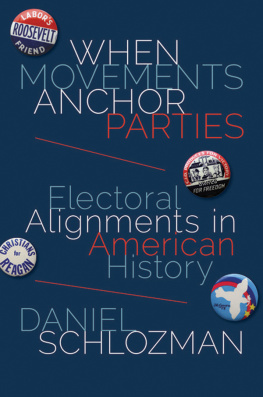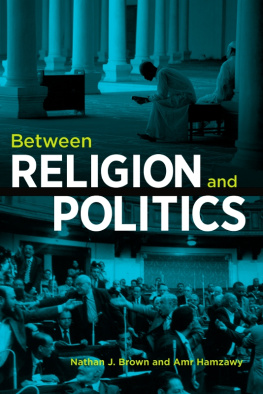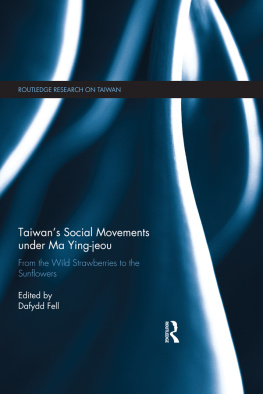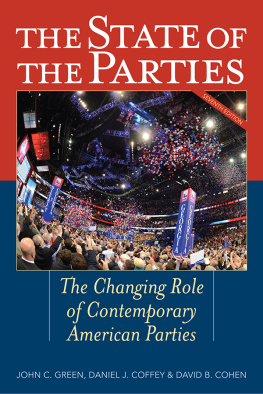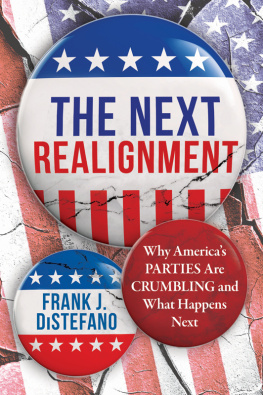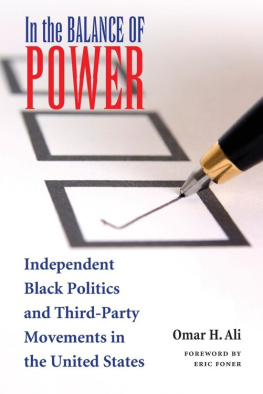When Movements Anchor Parties
PRINCETON STUDIES IN AMERICAN POLITICS:
HISTORICAL, INTERNATIONAL, AND COMPARATIVE PERSPECTIVES
Ira Katznelson, Eric Schickler, Martin Shefter, and Theda Skocpol, Series Editors
A list of titles in this series appears at the
Copyright 2015 by Princeton University Press
Published by Princeton University Press, 41 William Street, Princeton, New Jersey 08540
In the United Kingdom: Princeton University Press, 6 Oxford Street, Woodstock, Oxfordshire OX20 1TW
press.princeton.edu
All Rights Reserved
ISBN 978-0-691-16469-4
ISBN (pbk.) 978-0-691-16470-0
Library of Congress Control Number: 2015935301
British Library Cataloging-in-Publication Data is available
This book has been composed in Sabon Next LT Pro
Printed on acid-free paper
Printed in the United States of America
10 9 8 7 6 5 4 3 2 1
In what will the history of a party consist? Will it be a simple narrative of the internal life of a political organization? Clearly it will be necessary to take some account of the social group of which the party in question is the expression and the most advanced element.
A NTONIO G RAMSCI, Selections from the Prison Notebooks
All the New Right has done is copy the success of the old left.
R ICHARD V IGUERIE, The New Right: Were Ready to Lead
Acknowledgments
A S I HAVE TOILED FOR FAR TOO LONG ON THIS BOOK, LET ME BEGIN WITH A round of appreciation to absolutely everyone who has pointedly, and often reproachfully, asked me when I might finally finish. Extraordinary scholars supervised the dissertation from which this book arose. Theda Skocpol, my advisor, trained me that thinking historically and thinking rigorously go hand in hand. She has watched over this project since its gestation. Without her, it would have been done badlyor not at all. Andrea Campbell, ever supportive, taught me to turn concepts into prose, not least by learning what should get left on the cutting-room floor. Eric Schickler combines deep knowledge about American political history, wide-ranging interests in political science, and remarkable good cheer. Sid Verba has rare wisdom about many subjects academic and otherwise. I would be a better scholar and person if I took all his adviceat least Ive now followed his dictum to get it done.
My thinking on religion owes much to the Saguaro Seminar, and particularly to Valerie Lewis and Robert Putnam. My colleagues at Johns Hopkins University have provided a wonderful environment in which to complete this book. I thank Bentley Allan, Joe Cooper, Matt Crenson, Ben Ginsberg, Adam Sheingate, Lester Spence, Steve Teles, Chloe Thurston, and Emily Zackin for all their thoughts on the manuscript.
Over the years, more discussants, panelists, and friends than I can recount have offered thoughts or have read particular sections. Dorian Warren offered detailed notes on the labor chapters. Paul Frymer and David Karol traveled to Baltimore for an extremely stimulating book conference that helped me to clarify the argument. Entirely unbidden, several special people read the entire manuscript: John Corcoran (every liberal should have so steadfast a right-wing friend), Colin Moore (who also provided a beachside tutorial on the political development of Hawaii), Sam Rosenfeld (whose combination of political historian and editor gave this book its title), and Kay Schlozman (thanks, Mom). Dan Galvin and an anonymous reviewer provided extensive and helpful comments for Princeton University Press. As only those who saw early drafts could possibly understand, the concepts and the prose alike owe much to their now-virtual red pencils. At the press, the editor, Eric Crahan, Jenny Wolkowicki, and Joseph Dahm skillfully brought the book into print.
For more than a decade, I spent my spare hours doing party politics, and even served a term as chair of the Cambridge (Mass.) Democratic City Committee. I count all the mornings holding signs in the cold, and all the nights on folding chairs in storefront offices, as my real education in politics. So many mentors taught me how to play the gameand, still more important, why its worth the good fightamong them Mo Barbosa, Jarrett Barrios, Donna Barry, Larry Field, Helen Glikman, Avi Green, Elaine Kistiakowsky, Gerry McDonough, Jesse Mermell, K.D. Mernin, Mark Puleo, Trellis Stepter, and Alice Wolf. I especially remember Brian Murphy, whom we lost far too soon.
Finally, I thank my family. My sister, Julia, bucked up my spirits and listened to tale after tale of political intrigue. My parents, Kay and Stan Schlozman, offered equal and opposite contributions: my mother has always taken me and my ideas seriously; my father has never taken me too seriously. In the fall of 1934, at the tender age of fifteen, my grandfather, Elliot Lehman, moved from one seedbed of the New Deal to the other. After graduating from DeWitt Clinton High School in New York City, he headed off to the University of Wisconsin. His father thought that Elliot would be looked after in Madison by a cousin on the faculty, the labor economist Selig Perlman. (That very spring, I recently learned, Perlman had supervised the senior thesis of Wilbur Cohen, soon to become Mr. Social Security.) As it transpired, Cousin Selig was too busy writing about the job consciousness of American trade unionsa concept that returns in the pages that followto pay Elliot much heed. However, Elliot soon met a whip-smart Chicagoan named Frances Mecklenburger, and they recently celebrated their seventy-fourth anniversary. So, as the circle comes round, I dedicate this book to my grandparents, lifelong New Deal Democrats all: to the memory of Mary and Morris Schlozman, and to Frances and Elliot Lehman.

